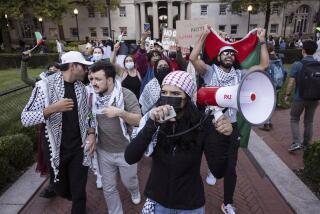BUSH IN EUROPE : It’s ‘Das Kapital’ and Profits Too at Marx University
- Share via
BUDAPEST, Hungary — As President Bush extolled the virtues of capitalism Wednesday at Karl Marx University of Economics, some professors recalled the not-so-distant past, when the school offered a class in bourgeois economics--and “profits” was a term synonymous with worker exploitation.
“At that time it was impossible to criticize the socialist planned economy,” said Mihaly Simai, who began teaching at Karl Marx in 1953. “One had to go through a lot of personal changes in beliefs, because if you criticized the state, you were not at the university the next day.”
No longer. The word profit has been rehabilitated and today is embodied in Hungarian entrepreneurs such as the man who sees an opportunity in selling pieces of the fence that his government is dismantling at the Austrian-Hungarian border.
But, although Bush in his speech Wednesday made several deprecating comments about Marx and applauded the university for dropping his “Das Kapital” from its required reading list, students said that for now, the state still ladles out Marxist-Leninist dogma through a required political economics class.
“The lectures are tiring and boring and they don’t reflect the economic changes outside,” said 23-year old Attila Ledenyi, a recent graduate who was on hand Wednesday to glimpse the first U.S. President to ever visit Hungary.
More than 1,000 students and teachers crowded into a huge, pillared lecture hall hung with Hungarian and U.S. flags, while a bronze statue of the school’s bearded German namesake languished behind the wooden platforms built for TV crews, out of sight and, in Hungary today, increasingly out of mind.
Praise for Training
But if students doze through their required Marx lectures, they also praise the university’s stimulating intellectual atmosphere and its rigorous theoretical training.
They also tout the downtown college overlooking the Danube as a hotbed of radical activity. In the 1950s, former Premier Imre Nagy, who was reburied as a hero last month after being hanged as a traitor in 1958 for leading the Hungarian uprising two years before, taught agricultural economics here. Until the mid-1980s, underground musicians and poets whose works were deemed too political for concert halls found a haven--and an audience--among the resident thinkers.
Some of Hungary’s radical student leaders, notably from the Young Democratic Federation, or FIDESZ, sprang from Karl Marx University’s neoclassical walls. So did Miklos Nemeth, Hungary’s premier, who is allied with reform groups. The building itself, designed between 1871 and 1874 by the architect who also designed the state Opera House, has capitalistic roots: It originally was Hungary’s Customs House, used to process Danube River cargo.
The college was originally known as the Budapest University of Economics, but it took over the Danube bank site and was renamed in 1951 as part of a Communist educational manifesto.
Over the years, the frequent changes in the Hungarian political arena were mirrored by revisions in the curriculum.
The school has gone from using dreary Soviet texts in the 1950s to works of well-known Hungarian social economist Janos Kormai in the 1980s. Kormai’s book “Shortage” criticizes centrally planned economies for causing shortages in everything from guns to butter.
“The teachers at this university were always a few steps ahead of the general government,” says Akos Zala, 25, who graduated three days ago and called the Bush speech “a nice gesture.”
Logical Theories
Antal Matyas, a Karl Marx professor whose history of non-Marxist economic thought has been acclaimed and translated into English and Japanese, agreed with Bush’s proposals to stimulate investment in Hungary.
“These theories are logical, very beautiful, and they deal with questions that Marxism doesn’t answer,” Matyas said, using descriptions one doesn’t normally associate with finance.
Indeed, those who gathered Wednesday for Bush’s speech stressed that they are taught free-market theories today, albeit filtered through a Marxist lens.
But students say the school fails to provide enough practical experience in how a free market works.
“When I went to the Frankfurt Stock Market last year, I had no idea what they were doing and how it worked,” lamented Gyorgy Nonn, who graduated in 1976.
Gabor Kereszturi, a 24-year-old former Karl Marx student who is managing a 4-million forint ($67,800) contact lens business for a Hungarian-American joint venture, discovered his school’s shortcomings while spending a year in the United States on a business fellowship.
“The Hungarians were equal to the American students when it came to theoretical skills, but they lacked the practical knowledge to negotiate and get a project started,” Kereszturi said.
Potential Solution
That is a problem for which the Karl Marx University thinks it has a solution. Mindful of the recent economic reforms, the university is now offering classes in marketing, public relations, computer modeling and how to raise venture capital and launch a small business.
And officials say the political economy class will be tossed into the Danube come September.
Would the father of socialism roll over in his grave? Simai, who has seen many changes in his 39 years at the university, thinks not.
“Marx was a smart fellow who questioned reality, and if he were alive today, he would realize the world has changed and he would think in a modern way.”
More to Read
Sign up for Essential California
The most important California stories and recommendations in your inbox every morning.
You may occasionally receive promotional content from the Los Angeles Times.













